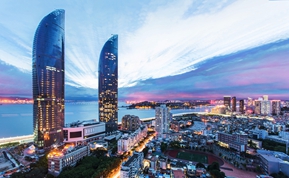Development zone surging toward carbon neutrality goals
Xiamen Torch Development Zone for High Technology Industries has encouraged businesses to practice green development by introducing preferential policies and services, as part of its effort to contribute to the country's goals of hitting a carbon emissions peak before 2030, and achieving carbon neutrality before 2060.
Located in Xiamen, East China's Fujian province, the zone is home to more than 12,000 businesses and has attracted Fortune Global 500 corporations to set up a total of 31 projects.
In October, the zone issued an action plan, supporting businesses to implement energy management contract-like modes to increase their energy efficiency.
Energy management contracts are a market-based mechanism that promotes energy conservation.
According to the plan, from September to December 2022, projects that carry out energy management contracts will be granted incentives, with the maximum amount reaching 1.5 million yuan ($234,580) for each company.
As a national-level high-tech area, the zone has promoted the construction of smart energy projects based on internet technology.
The zone has initiated a project that integrates internet-based smart energy with intelligent manufacturing, which was listed among the first batch of national energy projects last year.
The project has been developed to meet the multiple capacity needs of the zone. Based on the zone's resources, the project gives priority to renewable energy such as solar energy. It aims to establish a flexible and open network to help increase the efficiency of energy recycling and usage.
It also helps to contribute to realizing the integration of energy and information in the zone, and develop a business pattern that coordinates energy production, trading, service and consumption, according to the zone.
Under the support and guidance of the zone, its businesses have also practiced energy conservation and emissions reduction.
ABB Xiamen Hub, an industrial arm of Swiss technology and engineering company ABB, in the zone, is constructing a photovoltaic system and optimizing its energy storage system to facilitate the construction of an intelligent park project.
Photovoltaic and energy storage are two measures for ABB to carry out energy conservation, according to Jiang Ying, manager of the digital business at ABB China.
"Better energy saving and emissions reduction require digital methods," Jiang said.
At ABB's hub, all of its intelligent equipment is able to track and analyze energy consumption and transfer real-time data to help employees design solutions that are greener and more energy-efficient, according to the company.
For example, the company's intelligent electricity distribution control system combines monitoring, optimizing, prediction and management of energy use. It can save 30 percent of the cost of electricity and 40 percent of operation and maintenance costs.
The hub will develop its smart park project into a benchmark that coordinates the operation of capacity and storage between the source and network, Jiang said.
The park project is expected to be completed next year. ABB will cooperate with related partners to promote its intelligent energy mobilizing technology and the smart park project, and thus to contribute to the goals of peaking carbon emissions before 2030 and achieving carbon neutrality before 2060, Jiang added.
Clenergy, a high-tech renewable energy company in the zone, provides businesses with intelligent energy-saving solutions and products.
With technologies including cloud computing and artificial intelligence, Clenergy has realized more intelligent energy management, said Hong Wei, chairman of the company.
Earlier this year, the company developed a system that combines intelligent photovoltaic and digital energy management, which can present the real-time circumstance of the company's energy operation.
Through digital innovation, the system not only helps learn about the situation of energy consumption but also helps predict its trend and contributes to more specific management of energy, Hong said.
Clenergy has set up an array of solar photovoltaic panels. Hong said the company has a total of six photovoltaic-powered systems, generating 30 percent of the power for Clenergy.
According to the company, its photovoltaic-powered systems are expected to generate about 11 million kilowatt-hours of electric power and will reduce carbon dioxide emissions by 10,967 metric tons over a 25-year period.
Next year, Clenergy said it plans to operate with zero carbon emissions, utilizing electricity completely generated by clean energy.
Focusing on combining industrial production with environmental protection, the zone has invited the third-party environmental protection service institutions to help in its environmental management and aid its businesses in eco-friendly production.
This year, the zone has signed a technological service contract with Xiamen University to help local businesses in the treatment of waste and improve the zone's environment.
According to the contract, professional teams from Xiamen University will provide suggestions and references for the zone's space planning, infrastructure facilities construction and industrial layout to mitigate risks to the environment.
The zone has launched an online platform that offers environmental protection information to businesses and provides them with services including sharing the zone's environment situation, environmental policies, and related consultancy. So far, the platform has received updated environmental data from 663 companies with regard to their progress in tackling pollution.
Apart from the online platform, the zone said it has organized training and conducted inspection tours to help businesses tackle difficulties in environmental protection.
This year, it has provided 45 environmental services for 25 companies, according to the zone.
Guo Wei and Liu Qing contributed to this story.
Why Xiamen
-

Xiamen is one of the most economically competitive cities in China and was one of the first Special Economic Zones on the Chinese mainland. As a vice-provincial city independently listed on the State development plan, it has provincial-level authority in economic administration and local legislative power. In 2010, the Xiamen SEZ was expanded to cover the entire municipality. Today, Xiamen is a modern and international port city.
